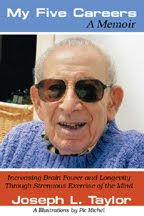This piece is mostly true but it contains some extrapolations relating to other members of the family.
This piece is mostly true but it contains some extrapolations relating to other members of the family.

Karyn and Mary are the two most courageous and admirable people I have ever known. They are both wheel chair bound, yet they are the two most cheerful and outgoing people in our condominium of about 200 residents. Karyn is able to walk for a very short time with the aid of a walker, but the only occasions upon which I have seen her doing so are a few times when she has come to my apartment two floors below, in our elevatored building, to have dinner, or to bring cookies she baked, or a Belgian dessert sauce she made. Occasionally we go to lunch in a restaurant.
Mary, a strong, sturdy personality, is older than Karyn. When I am with her, my own energy level rises because of her openness and enthusiasm. She has two children and four grandchildren. Mary, too, is a college graduate and by occupation was an automotive consultant. Her job took Mary all over
Whatever it is that fortifies people to cope, Karyn and Mary have it in abundance. An aggressive denial of incapacitation, such as they have, helps. The student voted as “most likely to succeed” might glide through life as though it was a bowl of jello. But for the Karyns and Marys, daily living is a combat with hostile forces. Karyn and Mary help the rest of us to see our lives in a healthy and rewarding perspective. Think of that when you pass a man or woman on the street in a wheel chair. In particular, give Karyn and Mary a secret salute.
Photo courtesy of schipulites photostream: Ms Wheelchair Texas at flickr.com

No matter the circumstances into which we were born, no matter the personal
I feel it to be one of the triumphs in my life that I came to appreciate this before my final hours. I am a few months shy of age ninety-four. My name is Joseph L. Taylor. Welcome to my blog.
All text on the blog is belongs to Joe Taylor, copyright 2009, all rights reserved. All cartoons copyrights are belong to Joe Taylor (lines) and Pic Michel (illustrations) respectively, 2008 and 2009, all rights reserved. If you would like to use this work elsewhere, please contact us. If you would like to procure Joe's illustrated memoirs containing many excellent essays, advice on maintaining mental acuity into later life, and 30 pages of timely cartoons...it will soon be available from Dog Ear Press at Amazon and many local stores. More Soon!